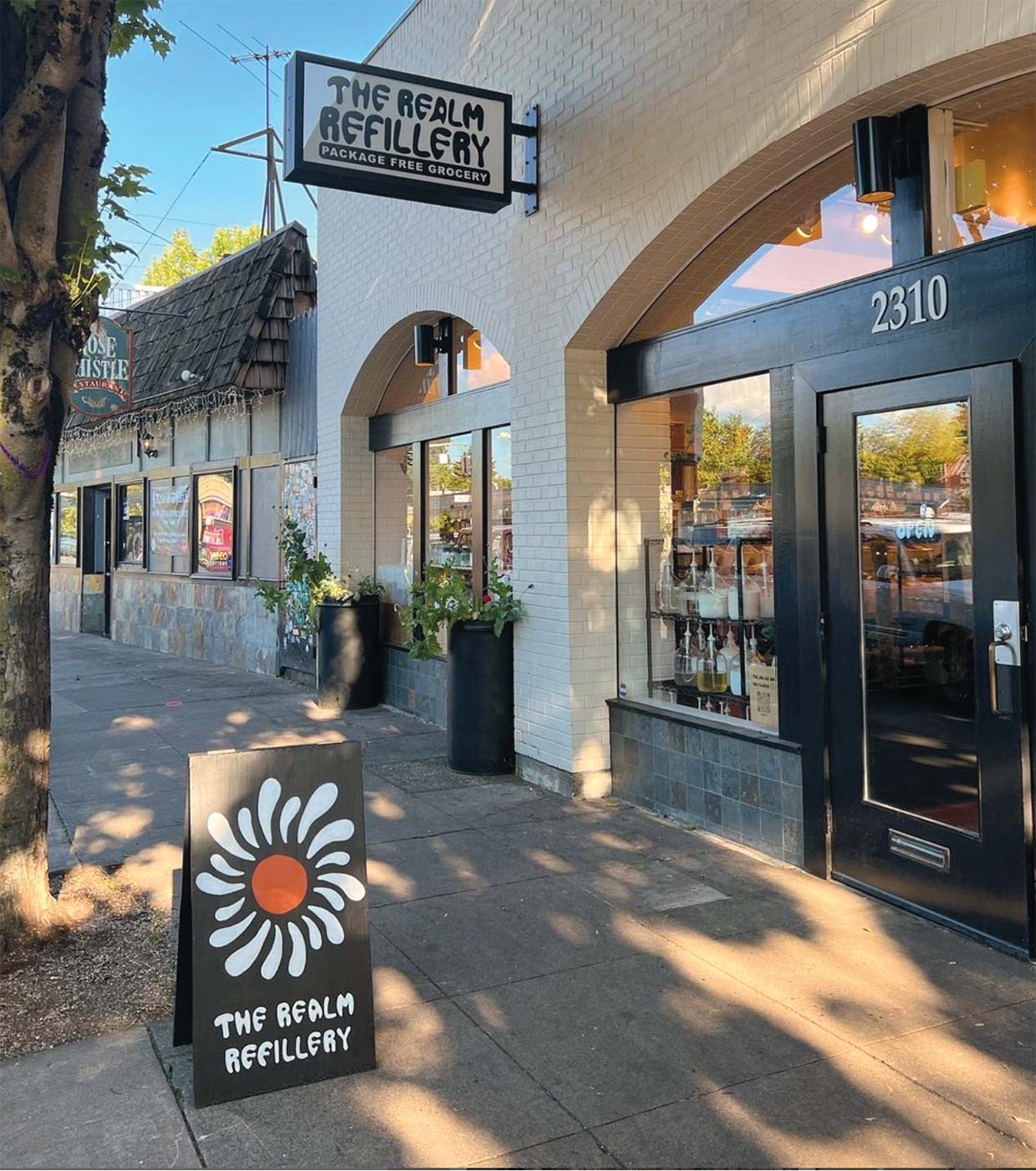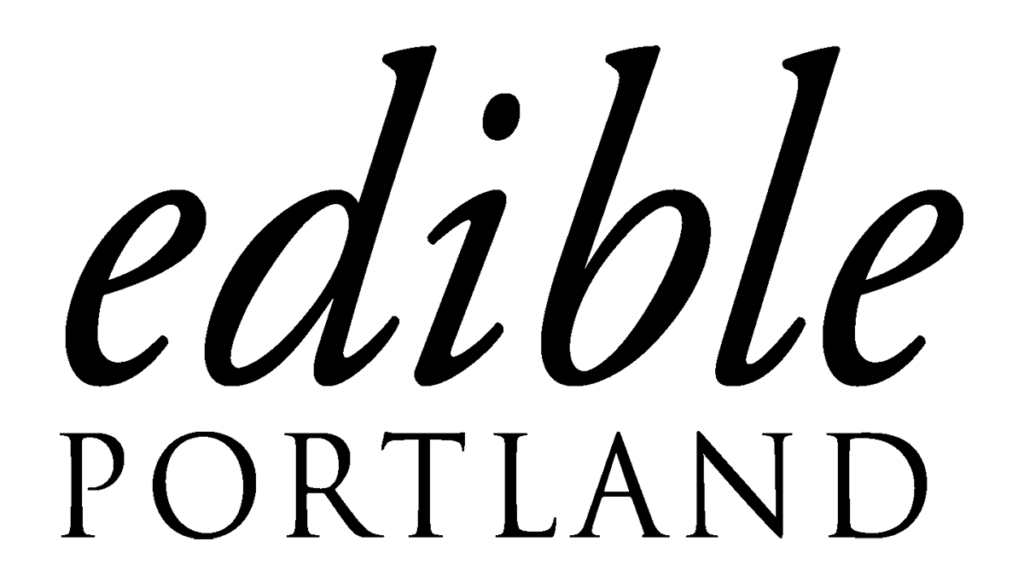
Portland is filled with environmentally conscious, sustainability-minded people. Many of our favorite businesses are certified “B Corp”; we have sixty community gardens and almost forty farmer’s markets (a few of which are year-round despite our rainy weather). We’ve always been a self-starting city with a DIY reputation and a progressive bent.
For all of our bring-your-own-bag efforts and composting, many Portlanders recognize that combating climate change is primarily in the hands of a few corporations and billionaires, and our efforts can feel futile. Earlier this year, the Center for Climate Integrity found that companies producing plastic have known most of what they advertise as recyclable isn’t.
Stores such as The Realm Refillery on Northeast Broadway, a low-impact, package-free grocery store, can help curb nihilist tendencies. Could the store be solely responsible for warding off the effects of global warming? Of course not, but there are benefits to shopping there that can genuinely make a difference on a more micro level within our Portland community.
Realm Refillery, owned by Brit and Ryan Snipes, celebrated their second anniversary in May. They’ve transformed many Portlanders’ relationships to sustainability within those two years. They’re in good company with other low-waste stores (Mama & Hapa’s Zero Waste Shop, Null Refillery, Replenish Home Goods). They are eager for other similar shops to open across the city. Though these other stores provide great options for sustainable home goods, cleaning supplies and body care, Realm is the only shop emphasizing groceries.
All of their products are plastic-free—you won’t find cellophane-wrapped vegetables or even plastic bags of snacks. Instead, they have an extensive selection of bulk items, from the standard nuts and legumes you see in most grocery store bulk sections to a condiment bar, complete with chickpea miso, local ketchup and sauerkraut. They have a wall of cooking oil, a section for nut butters, Jasmine Pearl Co. teas, bulk Ota Tofu, (available frozen in paper bags, or fresh). A large section is dedicated to shampoo, conditioner, lotion, makeup remover and other body and hair care items, as well as products like glass cleaner, dish soap and laundry detergent.
The store sells jars and Tupperware, but you can also bring any jar or container from home as long as it’s empty and clean. When you walk in, you weigh all of your empty vessels and attach wooden token scanners that Realm Refillery provides, which track the weight of each container. When checking out, that empty weight is subtracted from the product’s weight.
The store wasn’t always set up this way. Brit described them as “bright-eyed and bushy-tailed,” all set to open in 2022 when they found out the Oregon Department of Agriculture didn’t allow customers to bring in their refillable containers, despite many stores skating under the radar, using a similar system. Brit said that typically the ODA worries more about food regulations in restaurants than refillable containers. Still, because the shop was brand new, they had more eyes on them. They questioned if it was even worth opening—knowing that a crucial part of their store couldn’t run as expected.
Ryan has always described Brit as “relentless”—there was no way this setback would stop them. They devised a deposit system—the shop provided containers, and customers paid a deposit, used the product, and brought it back. Then, the container would be sanitized and reused.
Brit stayed optimistic despite seeing customers walk in and walk right back out, day after day. She understood that the deposit system was a little clunky and required a significant upfront cost to the customer, but she’d ask customers to sign her petition before they left.
The Snipes wrote up a bill in the hopes of changing the legislation. With the help of the Surfrider Foundation and Senator Janeen Sollman in Central Oregon, their legislation was passed in February 2023. Customers could now bring their own free-of-debris container, and Realm Refillery’s sales tripled.
Brit and Ryan call their store “low-impact” rather than “zero-waste” because, as Brit says, zero-waste is unattainable. They want to make shopping there as approachable, unintimidating, and accessible as possible.
Brit was raised by a single mom who always budgeted and chose groceries carefully. She said that her mom would have benefited from a store like hers—instead of buying a big bag of rice that was out-of-budget for the week, she could’ve bought a couple of cups at a time. Brit mentioned that when she moved to Portland a few years ago from South Carolina, she was shocked at the cost of groceries. Grateful for the Northwest’s access to incredible produce and locally-made products, she wanted to find a way to make shopping sustainably and locally more attainable.
“You have to make sure that it’s accessible, but you also want to make sure that you’re paying everyone who works there a livable wage, so how do you balance that?” Brit asked rhetorically. She explained that selling cleaning and home goods and even a makeup line can balance out pricing for much of their groceries simply because those other products have a higher profit margin. Brit described their products as “tiered” in price, offering options for those with higher and lower budgets. Realm Refi llery plans to sell more housemade items—they already sell handmade candles and a sea salt hair texturizing spray, which are found in their most affordable tier.
“Not only are we strengthening our local food system, but we’re doing what we wanted to, which is promoting equity back into the local economy and making sure that it’s possible for everyone,” Brit said.
Realm Refillery sells tons of Pacific Northwest-grown produce from Eloisa Farm, Empowered Flowers, and Groundwork Farm, in addition to local products like Ota Tofu and Hot Mama Salsa. One of Brit’s favorite products is fried seitan “chicken,” made by Black-owned restaurant Dirty Lettuce on Northeast Fremont Street and sold in their freezer section.
Realm Refillery also helps support local nonprofits and businesses, like Black Futures Farm and Equitable Giving Circle. They have a voucher program to raise money for causes the Snipes and their team care about and incentivize shoppers. For every five visits to the store, the customer gets a $5 voucher they can use toward their groceries or donate. Initially, the voucher program was based on money spent. Still, Brit worried it could alienate those spending less but visiting often, so she changed the format. “I want everyone to have a seat at the table,” she said.
Brit is often asked about scaling up, but she insists that her whole point is to keep the business small—a smaller business means less waste and more intention. The Snipes do hope for even more community engagement moving forward.
“We want to do workshops and events that not only focus on sustainable living and low-waste practices, like making a worm composting bin, or your own candles or bar of soap, but we think that by really empowering individuals, it allows positive changes in our daily lives,” Brit said. “That’s what we all need right now.”

